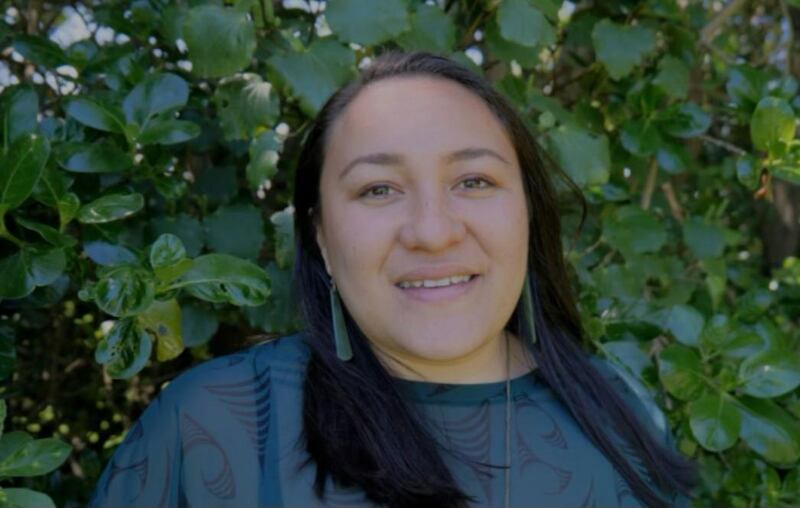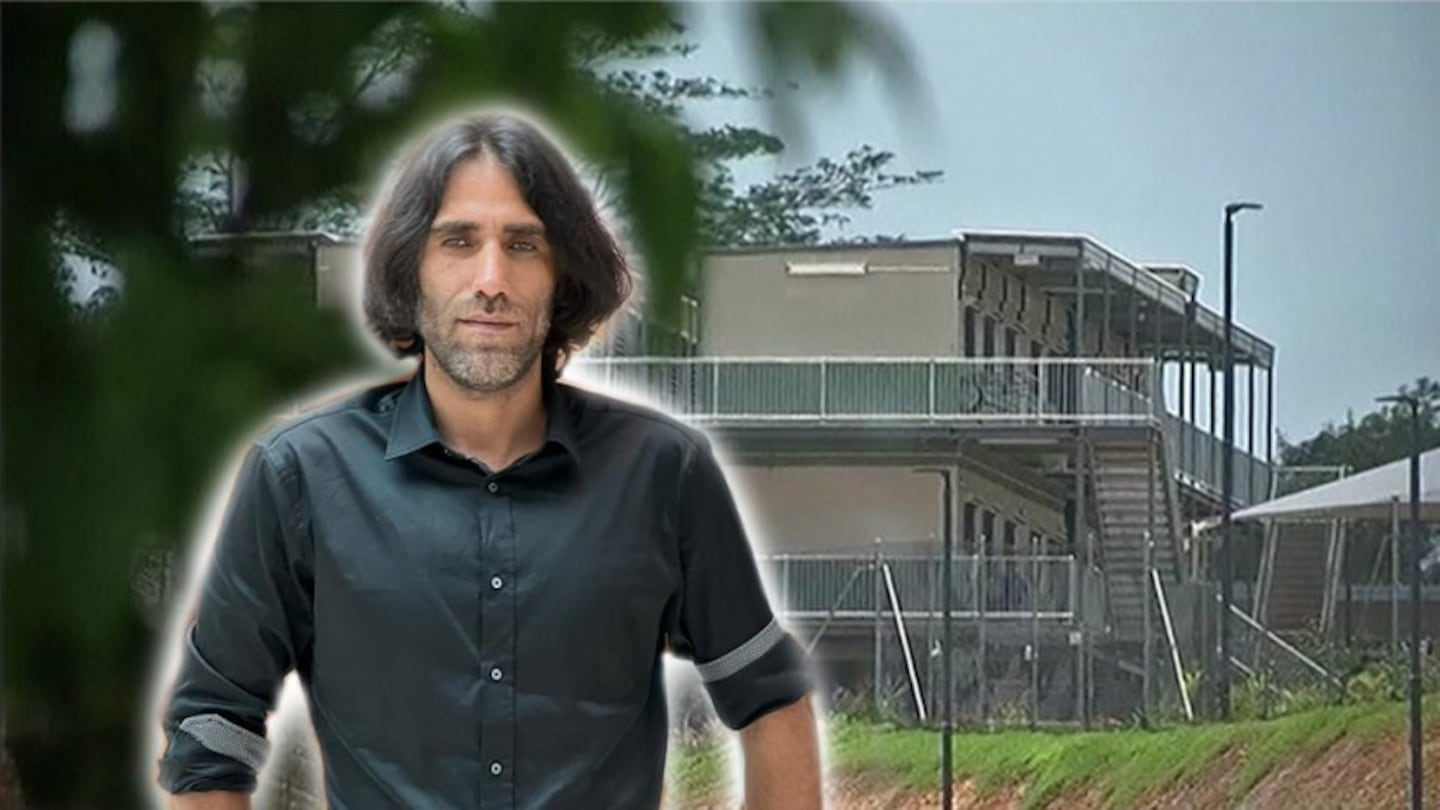Kurdish Iranian journalist and author Behrouz Boochani spoke out about Australia's offshore detention centres, including Manus Island where he was stuck for six years. Photo / Composite image, Getty Images
As Prime Minister Chris Hipkins was feted by Australian Prime Minister Albanese on Tuesday, the controversial Kiwi resident the Aussie opposition leader Peter Dutton once swore would never be allowed into Australia also walked into the Commonwealth Parliament.
Kurdish Iranian journalist and former refugee Behrouz Boochani then promptly called for an end to Australia's offshore immigration detention facilities for asylum seekers and refugees.
Boochani had been an inmate at the Manus Island facility for six years and famously wrote his first book describing the harrowing conditions the refugees faced. Ironically, the book, No Friend but the Mountains, won the 2019 Victorian Prize for Literature but he couldn't attend the ceremony because he was still detained.
Later he was allowed to visit New Zealand where he sought asylum and residency was granted but he has continued to speak up on the issue, which has an important New Zealand connection and possible solution.
He is not alone in his views.
PM's visit an opportunity
For JustSpeak executive director Aphiphany Forward-Taua, Australia’s treatment of asylum seekers is not in line with the United Nations conventions it is a signatory of. “These detention centres are a stain on the reputation and mana of Ahitereiria,” she says.
And she saw the Prime Minister’s visit to Australia as an opportunity to speak on the issue.
"Ko tēnei tētehi kowhiringa mō te Pirimia Hipkins ki te tū tōtika tōna tuara i runga i tēnā atamira, ki te maumahara a Pirimia Albanese e pā ana ki tōna mea i haenatia rātou ki te UN anō hoki," she says.
(This is an opportunity for Prime Minister Hipkins to take a strong stance on this stage, to remind Prime Minister Albanese to fulfill obligations to the conventions signed with the UN)
Australia started sending asylum seekers who arrived on its shores by boat (or were intercepted en route) to its offshore immigration detention facilities in Nauru and Manus Island, Papua New Guinea in 2001. The practice stopped briefly in 2008 before being resumed in 2012. The detention policy also applies to children, whether accompanied by adults or travelling alone.
New Zealand's offer
Since 2013, Australia’s policy has been that anyone who has been detained in these centres can never be settled in Australia, even if they are granted refugee status. The only way out is for a third country to offer them resettlement.
Back in 2012, New Zealand first made an offer to resettle 150 refugees a year from Australia’s detention centres.
Successive governments in Australia did not take up the offer. It was only in March last year that a deal was signed between the two countries that would allow 150 refugees a year for the next three years a pathway to resettlement in New Zealand.
Australia’s prolonged detention of those seeking asylum and their treatment in these centres have been widely criticised at home and overseas. The International Criminal Court’s prosecutor in 2020 called it “cruel, inhuman or degrading”, and a UN committee (OPCAT) report last year said it breached international law.
The response at home
Refugee Council of Australia chief executive Paul Power says people subjected to Australia's offshore processing policy have been held by or on behalf of Australia "against their will for over nine years.”
“A majority were later found to be in need of refugee protection,” Power says.
The joint press conference by the two Prime Ministers focused on issues of common interest, regional relations in the Pacific and the issue of 501 deportees. The offshore processing policy and the resettlement deals were not discussed.
The Australian Greens introduced a bill on Monday - the first sitting day of the parliament for the year, to evacuate all refugees from offshore detention in Nauru and PNG, and to support them in Australia until a durable third-country settlement is reached.
The bill found a vocal supporter in Boochani, who is now based in Te Whanganui-a-Tara.
From detainee to visitor
In 2019, the then Australian home affairs minister Peter Dutton said Boochani, whose book was written secretly using his phone before it was published in Australia, would never be permitted to come to Australia.
Speaking to Teaomaori.news from his hotel room in Brisbane, Boochani pauses when asked how it feels to be in that country. "Of course, in some ways it is enjoyable. And it is very surreal", he says.
He is currently on a tour of Australia where he has been promoting his second book Freedom, Only Freedom. He has visited many cities, he appeared in a session of ABC's Q+A on Monday and on Tuesday, he visited the Australian Parliament for the first time to offer his support for the Greens' tabled legislation.
“The whole system was designed to dehumanise people,” says Boochani. “They dehumanise refugees, they dehumanise people who committed no crime, and people who just seek asylum.”
Behrouz Boochani's visit to the Federal Parliament came on the same day the Labour government re-authorised Nauru as an offshore processing country. Photo: provided
According to Boochani, Australia’s treatment of asylum seekers and refugees arises from its colonial history. “Many people in Pacific nations are not happy with what Australia is doing, that Australia is using their land to punish people,” he says.
A ‘colonial mindset’
Aphiphany Forward-Taua agrees with the characterisation.
"Me maumahara mātou i te orokohanga o ēnei, ko Kuīni Wikitoria i whakatū ēnei mea. Ā, ka noho tonu ēnei ki roto i ngā whenua i konei, kei korā, kei tāwāhi anō hoki. He tāmitanga nunui te āhuatanga", she says.
(We must remember that the origin of these (offshore prisons) was under the reign of Queen Victoria, and continues to be present here, over there and overseas as well. It is very much an impact of colonisation.)

Aphiphany Forward-Taua (Ngāti Maniapoto, Ngāti Hinerangi, Ngāti Raukawa, Waikato-Tainui) is a lawyer and the executive director of JustSpeak, a "youth-powered movement for transformational change of criminal justice"
“The Australian government would say that the detention centres don’t have anyone in them, that people are living in the community,” the Refugee Council of Australia's Paul Power.
The detention centre in Manus Island was shut down after the Papua New Guinea Supreme Court ruled it illegal. About 85 former detainees remain in the country, says Power, after “Australia washed its hands and handed them off to the authorities in PNG.”
About 70 remain in Nauru. Last week, the Australian government awarded a $420 million contract to an American private prison company to manage detention facilities there. Australia has spent billions to keep people in indefinite detention, Boochani says.
“They established the border industry, the detention industry. We are not only fighting against the government and its policy. We are fighting against these companies as well - companies that benefit from this industry,” he says.
Aotearoa's response
“People seek asylum under international conventions, millions (have done) it over the past decade. But Australia has created a tragedy and our work is to expose that.”
Boochani says he has found support in civil society. His talks have drawn sizeable crowds and "people are generally very forthcoming and supportive,” he says.
“There are definitely millions of Australians who are deeply embarrassed by the way in which Australia has behaved,” Power says. “Very grateful to the government and people of New Zealand for stepping in and providing a way out for people who have very much been trapped by Australian politics.”
The joint press conference in Canberra on Tuesday with Prime Ministers Hipkins and Albanese made no mention of the offshore processing of asylum seekers. There are also no changes planned to Aotearoa’s offer of 150 refugee resettlements per year.
Second group arrived
New Zealand is “pleased to be able to provide resettlement outcomes for refugees who would otherwise have continued to face uncertain futures,” an Immigration New Zealand spokesperson says.
The second group of refugees from Nauru arrived in Aotearoa last month, bringing the total arrivals to 10. And while thanking New Zealand for providing a permanent solution, Amnesty International has said that the process is slow and a fast-tracking is necessary.
Immigration NZ’s spokesperson said it is working with the UNHCR and Australian government to make this happen as quickly as possible "but it will take time.”
International criticism hasn’t just been about the legitimacy of offshore immigration centres. Australia has also attracted criticism for the conditions inside these centres, reports of abuse and self-harm, and mental health concerns.
Australia is a party to the Refugee Convention and a signatory to OPCAT- the United Nation’s Optional Protocol to the Convention Against Torture and Other Cruel, Inhuman or Degrading Treatment or Punishment.
“OPCAT has a mechanism to look at what is happening in detention centres. It’s really unfortunate that Australia has failed to comply with reporting to this UN committee,” Power says.
Hold it to 'same standard'
Australia should be held to the same standards it seeks of the rest of the world, he says. “We would certainly be upset if countries, where we know certain human rights abuses are occurring, are also ignoring UN mechanisms such as these.”
In response to a query from Teaomaori.news, a spokesperson from Australia's Attorney-General's Department said: "The Commonwealth Government is dedicated to working in a cooperative manner with states and territories to achieve full OPCAT compliance."
It is incumbent on Aotearoa to raise these issues when it concerns our closest allies, Forward-Taua says. “We care about everybody throughout the world,” she says and when it comes to allies and partners, human lives and the experiences of vulnerable people shouldn’t be pushed aside for the purpose of economic or diplomatic gain.
“We should be supporting our allies where they are falling short,” she says.
Royal commission call
In the meanwhile, Australia’s offshore processing policy should come to an end, says Boochani. In a speech at the Parliament House in Canberra on Tuesday, he also called for a royal commission into the country's immigration detention regime.
A spokesperson for the Department of Home Affairs, Australia said the government "is committed to ensuring that asylum seekers are detained for as short a time as possible as necessary for the management of health, identity and security risks" and that the department would continue to work with the government on a range of measures aimed at addressing barriers to status resolution and associated risks of long-term detention.



